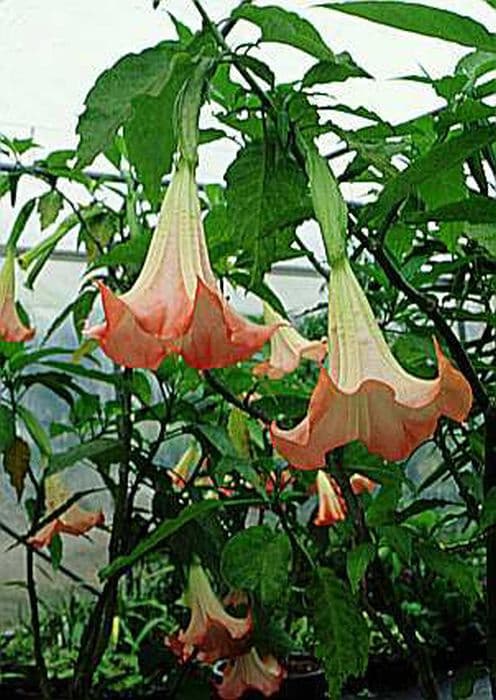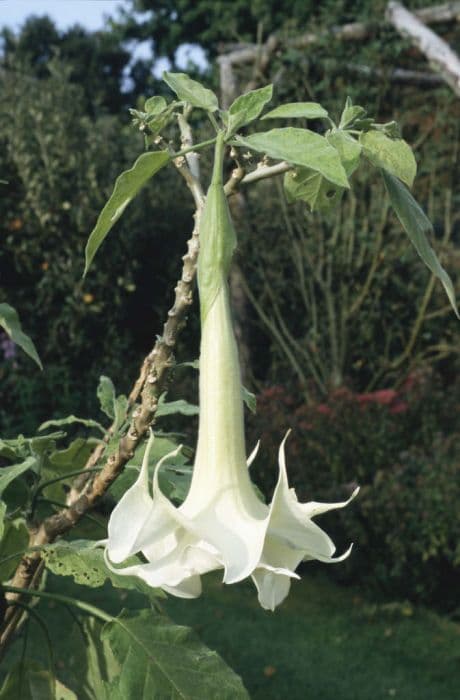Petunia Petunia Charlie's Angels Champagne = 'Caschamp' (Charlie's Angels Series)
![petunia [Charlie's Angels Champagne]](/_next/image?url=https%3A%2F%2Fplants-admin.emdemapps.com%2Fimages%2Fplants%2F%2Fimages%2F604b5ebc49058.png&w=3840&q=75)
ABOUT
The Petunia Charlie's Angels Champagne, often referred to simply as Petunia, is an ornamental plant renowned for its alluring and decorative blooms. This particular variety boasts flowers that exhibit a soft, champagne hue with a subtle blend of creamy tones that evoke a sense of understated elegance. The petals of the Petunia are velvety and exhibit a trumpet shape, which is characteristic of the species, attracting garden enthusiasts and pollinators alike. The flowers often display a slight gradation of color, from a deeper shade at the edges to a lighter, more luminescent color near the throat of the bloom. The center of the flower usually features a darker accent, adding depth to the overall appearance and highlighting the flower's delicate structure. The foliage of the plant presents a vivid green backdrop for the champagne-colored flowers, with leaves that are smooth to the touch and of a medium size, providing a lush and full appearance. The Petunia has a cascading habit, with stems that spread outward and allow the blooms to drape gracefully, making it a popular choice for hanging baskets, window boxes, and as a spiller plant in mixed containers where it can complement other plantings with its luxurious floral display. It's known for its generous flowering throughout the growing season, offering a long-lasting display of color and charm in any garden setting. Overall, the Petunia Charlie's Angels Champagne is a plant that exudes sophistication and radiates a gentle warmth with its champagne-tinted petals, contributing a touch of class and beauty wherever it is planted.
About this plant
 Names
NamesFamily
Solanaceae
Synonyms
Petunia, Charlie's Angels Champagne Petunia, Caschamp Petunia
Common names
Petunia 'Caschamp'.
 Toxicity
ToxicityTo humans
Petunias, including the Petunia Charlie's Angels Champagne, are not considered toxic to humans. They are commonly grown in gardens and used in horticulture without concern for human health. If ingested in small quantities, they are unlikely to cause any symptoms of poisoning. However, consuming any non-food plant material can potentially lead to gastrointestinal discomfort, nausea, or vomiting due to the plant's natural compounds and the human body's typical reaction to ingesting unfamiliar organic matter. It is always advisable to refrain from eating ornamental plants and to keep them out of the reach of young children who might be tempted to taste them.
To pets
Petunias, such as the Petunia Charlie's Angels Champagne, are generally considered non-toxic to pets. They are widely used in home gardens and are not associated with causing harm to dogs, cats, or other domestic animals if accidentally ingested. Pets that consume plant material can experience mild gastrointestinal upset, including symptoms like vomiting or diarrhea, simply because of the ingestion of non-dietary fiber or plant matter to which their digestive system is unaccustomed. As with any non-food item, monitoring your pet's behavior and seeking veterinary attention if any unusual symptoms appear is always a good practice.
 Characteristics
CharacteristicsLife cycle
Annuals
Foliage type
Deciduous
Color of leaves
Green
Flower color
Champagne
Height
1 foot (30 cm)
Spread
1 foot (30 cm)
Plant type
Herb
Hardiness zones
9
Native area
South America
Benefits
 General Benefits
General Benefits- Easy to Grow: Petunias are generally hardy and easy to care for, making them great for gardeners of all skill levels.
- Vibrant Colors: The 'Caschamp' variety offers a beautiful champagne hue that can add a pop of color to any garden or landscape.
- Continuous Blooming: Petunias are known for their long blooming season, often from spring until the first frost.
- Attracts Pollinators: The flowers attract bees, butterflies, and other beneficial insects that aid in pollinating other plants in the garden.
- Low Maintenance: Petunias have minimal maintenance requirements, only needing regular watering and occasional fertilization.
- Adaptable: They can thrive in a variety of soil types as long as there is good drainage.
- Suitable for Containers: Petunias are excellent for container gardening, allowing for vibrant displays on patios, balconies, and terraces.
- Ground Cover: They can spread and provide a colorful ground cover, controlling weeds and minimizing soil erosion.
- Edging Plants: Their growth habit makes them suitable for use as border or edging plants, creating neat garden lines.
- Versatile Use: Suitable for hanging baskets, window boxes, and landscape beds, they offer versatile use in gardening design.
 Medical Properties
Medical PropertiesThis plant is not used for medical purposes.
 Air-purifying Qualities
Air-purifying QualitiesThis plant is not specifically known for air purifying qualities.
 Other Uses
Other Uses- Photography Prop: Petunia flowers, with their vibrant colors, can be used as striking subjects or backgrounds for close-up photography.
- Art Inspiration: The diverse shades of the petunia can inspire artists, serving as a model for paintings and drawings.
- Educational Tool: Petunias can be used in schools to teach children about plant growth, pollination, and basic botany concepts.
- Fabric Dye: The petals of petunias, though not a traditional source, could potentially be used to create natural dyes for fabrics.
- Culinary Decoration: Edible varieties of petunias can be used as colorful garnishes for salads and desserts (ensure the species is safe for consumption).
- Crafting: Dried petals can be incorporated into handmade paper, candles, or potpourri for added color and subtle fragrance.
- Handmade Jewelry: The flowers and petals can be used in crafting handmade jewelry, such as resin pendants preserving the petunia's beauty.
- Event Ambiance: Petunias can be floated in water bowls as part of table centerpieces for weddings and other events.
- Biodegradable Confetti: Petunia petals can be used as an eco-friendly confetti alternative for outdoor celebrations.
- Mood Enhancer: Planting petunias in personal or community spaces can help improve the ambiance and contribute to overall well-being and joy.
Interesting Facts
 Feng Shui
Feng ShuiThe Petunia is not used in Feng Shui practice.
 Zodiac Sign Compitability
Zodiac Sign CompitabilityThe Petunia is not used in astrology practice.
 Plant Symbolism
Plant Symbolism- Anger and Resentment: In some cultural beliefs, petunias are thought to symbolize anger and resentment, possibly due to the intense and vibrant colors of some varieties.
- Desire: The petunia can also represent a desire or longing, which may be reflected in the way the flower stretches out and blooms with vigor.
- Comfort: The lush, full blooms of the petunia can symbolize a sense of comfort and the presence of a calming and stabilizing energy.
- Peace: Similar to comfort, petunias are sometimes associated with peace and tranquillity, offering a message of harmony to recipients.
- Companionship: Given as a gift, petunias might symbolize the pleasure of someone's company or the desire for spending time together.
 Water
WaterPetunias, including the 'Caschamp' variety, require regular watering to keep their soil moist but not waterlogged. It's generally recommended to water these plants deeply once a week with about half a gallon per plant, ensuring the water reaches the roots. During hot weather, you may need to water more frequently, such as every 2-3 days, monitoring the soil moisture level to avoid drying out. Always water at the base of the plant to avoid wetting the foliage, which can lead to fungal diseases.
 Light
LightPetunias like 'Caschamp' thrive in full sunlight, which means they should receive at least 6 to 8 hours of direct sunlight daily. The best spot for these flowers is in an area where they are exposed to ample morning sun, which is less harsh than the afternoon sun. However, they can tolerate some light shade, especially in regions with very hot summers.
 Temperature
TemperatureThe 'Caschamp' Petunia prefers warm weather and can generally tolerate temperatures between 40°F to 90°F. Frost can be detrimental to Petunias, so they should not be exposed to temperatures below freezing. The ideal temperature range for robust growth and blooming is around 60°F to 75°F.
 Pruning
PruningPrune the 'Caschamp' Petunia to encourage bushier growth and more blooms. Deadheading, or removing spent flowers, can be done regularly to encourage new growth. It’s best to prune Petunias every few weeks, cutting back the stems by a few inches to maintain shape and prevent legginess. The ideal time for pruning is in the morning when the plant is well-hydrated.
 Cleaning
CleaningAs needed
 Soil
SoilPetunias prefer well-draining and fertile soil with a pH between 5.5 and 6.5. A good mix for Petunia 'Caschamp' would consist of peat moss, compost, and perlite or vermiculite to facilitate drainage. Regular feeding with a balanced, water-soluble fertilizer will support its abundant flowering.
 Repotting
RepottingPetunias, including the Petunia 'Caschamp', generally do not need repotting as they are annuals. Instead, they are replanted each year with fresh soil and compost to ensure nutrient availability and optimal growth.
 Humidity & Misting
Humidity & MistingPetunias like 'Caschamp' enjoy moderate humidity levels but are quite adaptable and do not require specific humidity control. They thrive in outdoor conditions where the natural humidity of the environment typically suffices.
 Suitable locations
Suitable locationsIndoor
For Petunia 'Caschamp', ensure bright light, regular watering, and good air flow.
Outdoor
Place Petunia 'Caschamp' in full sun with moist, well-drained soil.
Hardiness zone
9-11 USDA
 Life cycle
Life cycleThe life cycle of the common petunia, including the Petunia 'Caschamp' from the Charlie's Angels series, begins with seed germination, typically occurring in warm soil with plenty of sunlight. After germination, the seedling stage sees the growth of cotyledons followed by true leaves, as the plant establishes itself. The vegetative stage follows, with the petunia developing a robust root system and fuller foliage to prepare for blooming. During the flowering stage, the petunia 'Caschamp' produces its characteristic champagne-colored blossoms that persist throughout the growing season, attracting pollinators and setting seed. If the seeds are allowed to mature and are dispersed, they can facilitate the next generation, completing the cycle. In colder climates, the petunia may die back in winter, a signal of the end of its annual or perennial cycle, depending on the growing conditions and plant hardiness.
 Propogation
PropogationPropogation time
Spring-Early Summer
The Petunia 'Caschamp' is primarily propagated through stem cuttings, which is the most popular method due to its simplicity and effectiveness. To propagate, take a stem cutting from a healthy plant in late spring or early summer when the plant is actively growing. The cutting should be about 3 to 4 inches long with at least two sets of leaves. Remove the leaves from the lower half of the cutting, and dip the cut end in rooting hormone powder for better results. Then, insert the cutting into a well-draining soil mix, ensuring at least one set of leaves is above the soil level. Water the cutting and cover it with a plastic bag to maintain humidity. Place the potted cutting in indirect light and keep the soil evenly moist but not soggy. Rooting usually occurs within 2 to 3 weeks, after which the plastic can be removed, and the new plant can gradually acclimate to its environment before transplanting.


![Calibrachoa [Aloha Classic Blue Sky]](/_next/image?url=https%3A%2F%2Fplants-admin.emdemapps.com%2Fimages%2Fplants%2F%2Fimages%2F604b636c3778b.png&w=640&q=75)
![Calibrachoa [Aloha Classic Gold]](/_next/image?url=https%3A%2F%2Fplants-admin.emdemapps.com%2Fimages%2Fplants%2F%2Fimages%2F604b6284c573e.png&w=640&q=75)
![Calibrachoa [Aloha Classic Tiki Soft Pink]](/_next/image?url=https%3A%2F%2Fplants-admin.emdemapps.com%2Fimages%2Fplants%2F%2Fimages%2F604b548e0a5ef.png&w=640&q=75)
![Calibrachoa [Cabaret Deep Yellow]](/_next/image?url=https%3A%2F%2Fplants-admin.emdemapps.com%2Fimages%2Fplants%2F%2Fimages%2F604b5f20ca3ef.png&w=640&q=75)
![Calibrachoa [Calibasket Radiant Orange]](/_next/image?url=https%3A%2F%2Fplants-admin.emdemapps.com%2Fimages%2Fplants%2F%2Fimages%2F604b536d43cb2.png&w=640&q=75)
![Calibrachoa [Caloha Classic Blue Velvet]](/_next/image?url=https%3A%2F%2Fplants-admin.emdemapps.com%2Fimages%2Fplants%2F%2Fimages%2F604b604884a75.png&w=640&q=75)
![Calibrachoa [Caloha Classic Honey White]](/_next/image?url=https%3A%2F%2Fplants-admin.emdemapps.com%2Fimages%2Fplants%2F%2Fimages%2F604b5f56e0beb.png&w=640&q=75)
![Calibrachoa [Caloha Classic Yellow Chocolate Ring]](/_next/image?url=https%3A%2F%2Fplants-admin.emdemapps.com%2Fimages%2Fplants%2F%2Fimages%2F604b538aede95.png&w=640&q=75)